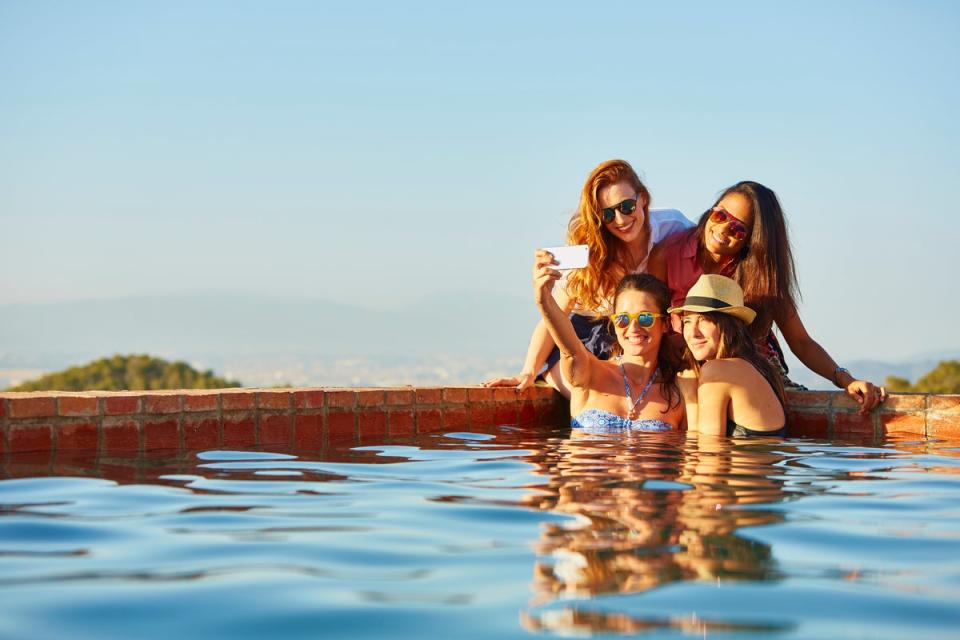The joys and complexities of planning a group holiday in your thirties

Group holidays are for kids, right? Teenagers slumped over one another on European streets, warbling nonsense into the night sky through tears, sweat and kebabs. School leavers soaked in fluorescent paint, doing shots of some obscure spirit that’s probably illegal in the UK. And university students waking up poolside with their jelly sandals still strapped on, their bodies burning in the scorching afternoon sun.
With this in mind, the prospect of planning a group trip when you’re over the age of 25 might seem bizarre. By this point, people tend to have serious partners. Proper jobs. And possibly even a child or two. Nobody has time for a silly little holiday with their friends. At least, this was how I felt in the middle of 2022 when, following a breakup, I found myself looking out at an entirely blank, and consequently rather bleak, summer. It wasn’t that people didn’t want to go away together – “I’m gagging to drink rosé and talk s*** for seven hours by a pool,” said one friend with a three-year-old – but few had the time, money or energy, let alone all three.
Those that did were impossible to galvanise. WhatsApp groups were made between various friendship groups. Screenshots of flights were shared (“Look, the EasyJet sale is on now!”). And links for various Airbnbs across obscure European cities were hotly debated. And yet, nothing happened, which is why that year I ended up going on my first solo holiday.
Having turned 30 last month, I found myself facing the prospect of once more going on holiday by myself. This was despite the fact that I was desperate for a big bawdy holiday with lots of friends, the kind I haven’t had in years because, for whatever reason, we leave these experiences behind in our youth. Yet surely these sorts of holidays are good for us, particularly now: last year, the World Health Organisation launched a commission to raise awareness of loneliness as a public health crisis. Meanwhile, there is ample research suggesting that feelings of belonging and connection can ease stress, reduce inflammation, and lower the risk of serious illnesses.
Why, then, are we not doing it? “Once we are in our thirties, life generally feels fairly heavy with responsibility,” explains counsellor Georgina Sturmer. “Paying the rent or mortgage, climbing a professional ladder, looking after children or parents or both. This squeezes our disposable income and our time. And that can make it much harder for us to organise a group holiday, which requires both time and money.”

There is also the matter of becoming older, wiser, and, well, a little more stubborn about what we do and don’t want from a holiday. This is a road bump I’ve come up against every time I’ve tried to plan one. “When time and money are precious, we become more discerning about how we want to choose to spend it,” adds Sturmer. “But by their nature, group holidays require a sense of compromise. So it can be a tricky balance to organise a group holiday that meets everyone’s needs and ticks everyone’s boxes.”
There are also, of course, many different types of holidays. And people want different things from each of them. Personally, I’ve only ever wanted to lie on a sunbed with a paperback shading my face and a cocktail to my right. When I was younger, this was also the general consensus among everyone I knew, on top of wild nights of partying, of course. But some friends need more activity: surfing, tourism, hiking routes. And so on.
But these are hurdles we should be trying to overcome. Because the benefits of being abroad with a group of people outside of your usual family unit can be hugely beneficial. As I moved through my twenties and arrived at 30, I noticed how much more time I spend on my own, particularly as a single woman. People are busy with their own lives and our paths diverge more than they used to, meaning plans have to be scheduled months in advance, and last-minute cancellations (due to work or family commitments) are common. Our friendships are no longer the priorities they once were.
“Connections with others are important for our wellbeing and group holidays can be a way to maintain friendships and to look after ourselves,” says Dr Charlotte Russell, clinical psychologist and founder of The Travel Psychologist. “Group holidays aren’t the only way to do this, but for many people having a break together can help them to reconnect in a deeper way. Travelling together in this way can also help us tune into our identity outside of our home lives and responsibilities, perhaps connecting with our fun and more carefree side.”
Connections with others are important for our well-being and group holidays can be a way to maintain friendships and to look after ourselves
Dr Charlotte Russell, clinical psychologist and founder of The Travel Psychologist
If you have managed to jump through all the necessary hoops to get a group trip off the ground, presumably with some impeccable teamwork and time management skills, then next you have the actual trip to consider. Navigating group dynamics can be tricky at the best of times, but particularly when you’re in a new environment. “It’s always best to narrow down the options,” advises the psychotherapist Kamalyn Kaur. “Too many choices result in a holiday that no one enjoys or no one ever gets round to planning. Think about which kind of holiday you want to have then find out which type of holiday a majority of the group are looking for and opt for that choice.”
It’s important to get comfortable with money conversations as early as possible. Whenever I’ve done group trips in the past, it has come up as a problem. People have different budgets. One person winds up paying for more than another. And it causes friction in the group. The best way to avoid this is to sort out some sort of system in advance: personally, I recommend using an app like Splitwise, which allows you to track everyone’s spending before splitting it in a way that allows each person to be reimbursed with the correct amount they’re owed.
While it can be tempting to let the loudest person in the group take the lead on all the big decisions – where to have dinners, what wine tasting to book, and which beaches to visit – this can also create tension down the line. “One person doesn’t have to be in charge of doing everything,” points out Justin Chapman, travel expert at Go2Africa travel agency. “It can be overwhelming to try to arrange and book travel for a group, and can end up making the trip feel more like a second job than a holiday, so make sure you delegate tasks to other people.”
It might sound juvenile but there are plenty of online polling tools that can help you decide on activities based on what the majority wants. You should also make sure to schedule some alone time; trust me, you’ll need it. When I was younger, there were trips where my social battery would completely drain, leaving me feeling resentful whenever I had to get dressed up to be around people again. “Group trips can be intense, with plans and activities scheduled for every minute of the day to keep everyone entertained,” adds Chapman. “So remember to plan for some downtime to avoid exhaustion and burnout, which can lead to irritability and tension. Even just an hour to yourselves can be the difference between a trip that goes smoothly and one that ends with arguments.”
Don’t get me wrong, solo travel is incredible and can offer similar benefits, partly because of how many people you meet as a result. There are ways to make it less daunting and combine it with group travel through tour companies – Flashback, which specialises in trips for people in their thirties and forties, has seen a 100 per cent increase year on year in bookings. “I think the reason why more people are seeking out group travel options with solo travellers they’ve never met, rather than friends – goes deeper than logistics alone. Ultimately, it’s about meeting new people and expanding your life in new and unexpected ways,” says Lee Thompson, co-founder and CMO of Flash Pack.
Fundamentally, travelling with other people can provide you with so many other things that solo travel can’t. For one, it is safer. “There are also opportunities for socialising, big excursions and celebrations, and an opportunity to deepen connections with lots of people at the same time,” says Eloise Skinner, author and psychotherapist. “On the other hand, if you feel that you drifted away from big group friendships and instead developed closer friendships with just a few people as you got older, you might prefer a trip abroad with just a few friends. I really think it depends on the person.”
This summer, I don’t have any massive group trips planned. But I do have a few holidays with smaller groups of friends, mostly arranged in fours or threes. These trips have been planned to reflect where all of us are now in our lives. There’ll be time to read, explore, go out, and everything in between. It might be more low-key than the trips I went on as an alcopop-obsessed teen but it’s still a close circle of people, enjoying one another’s company in a relaxing, new – and ideally warm – setting. Hopefully I’ll return with a slightly less brutal hangover, too.

